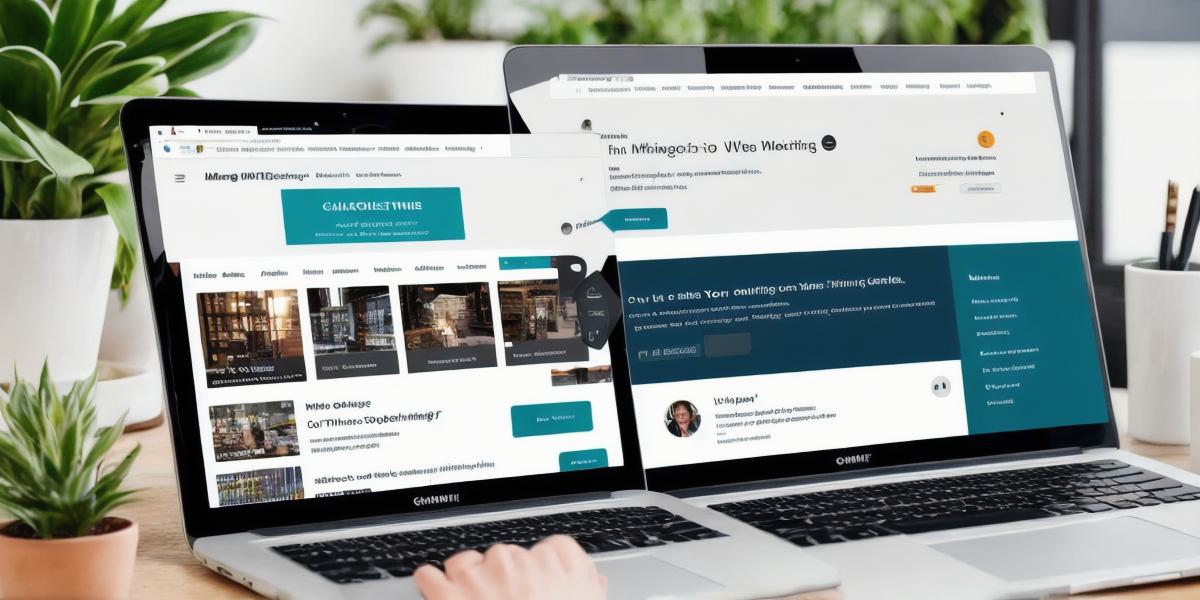Are you running a small business and struggling to get your name out there? Do you feel like you’re competing with big-name corporations for every customer? In this article, we will explore the most effective marketing tips for small businesses. We will also provide you with real-life examples to help you understand how these strategies can be applied in practice.
1. Focus on SEO
Search engine optimization (SEO) is a crucial aspect of any small business’s marketing strategy. It involves optimizing your website and its content so that it ranks higher in search engines like Google, Bing, and Yahoo. The higher your website appears in these search results, the more traffic you will attract to your site.
To improve your SEO, start by conducting keyword research. This involves identifying the phrases or words that people use when searching for products or services similar to yours. Use these keywords throughout your website’s content, including the title, headings, and body text.
Another important aspect of SEO is building backlinks. These are links from other websites that point to your own site. The more high-quality backlinks you have, the higher your website will rank in search results. To get started, reach out to relevant websites and ask them to link to your site.
2. Leverage Social Media
Social media platforms like Facebook, Twitter, Instagram, and LinkedIn can be powerful marketing tools for small businesses. These platforms allow you to connect with potential customers, build relationships with existing ones, and promote your products or services to a wider audience.
To get started with social media marketing, create accounts on the platforms that are most relevant to your business. Then, start posting engaging content that showcases your products or services. This could include photos or videos of your products, behind-the-scenes glimpses into your business operations, or blog posts about industry trends.
Don’t forget to engage with your followers by responding to comments and messages. This helps build trust and loyalty among your customers, which can lead to repeat business.
3. Run Paid Advertising Campaigns
While SEO and social media are great for organic growth, paid advertising can be a powerful way to reach new customers quickly. Platforms like Google Ads and Facebook Ads allow you to target specific demographics based on factors like age, location, interests, and behavior.
To get started with paid advertising, create a campaign that aligns with your business goals. For example, if you’re looking to drive more traffic to your website, you could create a Google Ads campaign that targets people searching for keywords related to your products or services.
Make sure to set a clear budget for your ad campaigns and track their performance regularly. This will help you optimize your ads and get the best possible return on investment (ROI).
4. Collaborate with Other Businesses
Collaborating with other small businesses or influencers can be a great way to expand your reach and attract new customers. For example, if you own a coffee shop, you could partner with a local bakery to offer special promotions for their customers. This would give both businesses exposure to a new audience and help drive traffic to each other’s locations.
To find potential partners, look for businesses or influencers that align with your brand values and target the same audience as you do. Then, reach out to them and propose a collaboration that benefits both parties.
5. Offer Exceptional Customer Service
Providing exceptional customer service is key to building customer loyalty and attracting repeat business. When a customer has a positive experience with your business, they are more likely to recommend you to their friends and family. This can lead to new customers and increased sales.
To offer excellent customer service, make sure that all of your employees are trained to be friendly, knowledgeable, and responsive to customer needs. You should also have a system in place for handling complaints and addressing customer concerns quickly.
Don’t forget to thank customers for their business and follow up with them after the fact. This can help build relationships and create a positive impression of your brand.
Real-Life Examples
To illustrate how these marketing tips can be applied in practice, let’s look at some real-life examples:
Example 1: SEO
Suppose you own a small bakery that specializes in organic bread and pastries. To improve your SEO, you could conduct keyword research to identify phrases like "organic bread," "artisanal bakery," and "local produce." Then, you could optimize your website’s content, including the title, headings, and body text, to include these keywords.
You could also build backlinks by reaching out to local food bloggers and asking them to link to your website in their posts. This would help drive traffic to your site and increase brand awareness.
A PLACE FOR A PICTURE #2
Example 2: Social Media
Suppose you own a small clothing boutique that specializes in sustainable fashion. To leverage social media, you could create Instagram and Facebook accounts for your business. Then, you could post photos of your products, behind-the-scenes glimpses into your business operations, and blog posts about sustainability and fashion trends.
You could also engage with your followers by responding to comments and messages. This would help build trust and loyalty among your customers, which could lead to repeat business.
Example 3: Paid Advertising

Suppose you own a small landscaping company that offers a wide range of services, including lawn mowing, tree trimming, and landscaping design. To run a paid advertising campaign, you could create Google Ads that target people searching for keywords like "landscaping companies," "lawn care services," and "tree trimming."
You could also set a clear budget for your ad campaigns and track their performance regularly to optimize your ads and get the best possible ROI.
Example 4: Collaborations
Suppose you own a small coffee shop that offers a wide variety of coffees and teas. To collaborate with another business, you could partner with a local roastery to offer exclusive blends of coffee for your customers. This would give both businesses exposure to a new audience and help drive traffic to each other’s locations.
Example 5: Customer Service
Suppose you own a small pet supply store that offers a wide range of products for dogs, cats, and birds. To offer exceptional customer service, you could train your employees to be knowledgeable about pet care and product safety. You could also have a system in place for handling complaints and addressing customer concerns quickly.
To thank customers for their business, you could send them a personalized thank-you note or offer them a discount on their next purchase. This would help build relationships and create a positive impression of your brand.
FAQs
What is the best way to improve my website’s SEO?
To improve your website’s SEO, conduct keyword research to identify relevant phrases for your business, optimize your website’s content to include these keywords, and build backlinks from other websites.
How can I leverage social media for my small business?
To leverage social media, create accounts on relevant platforms, post engaging content, engage with followers by responding to comments and messages, and track performance regularly.
What is the most effective way to run paid advertising campaigns for small businesses?
The most effective way to run paid advertising campaigns is to set a clear budget, target relevant audiences, optimize your ads, and track performance regularly to get the best possible ROI.
How can I collaborate with other businesses to expand my reach?
To collaborate with other businesses, look for partners that align with your brand values and target the same audience as you do, propose a mutually beneficial collaboration, and follow up after the fact to thank customers for their business.
What is the key to providing exceptional customer service for small businesses?
The key to providing exceptional customer service is to train employees to be knowledgeable and responsive to customer needs, have a system in place for handling complaints and addressing concerns quickly, and thank customers for their business to build relationships and create a positive impression of your brand.




